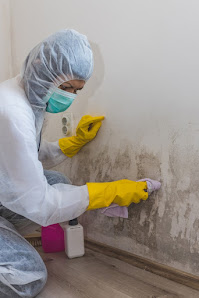Navigating Mold Damage Insurance Claims and Mold Insurance Claims: Your Essential Guide
Mold
damage can be a serious issue for homeowners and property managers alike.
Whether it's caused by water leaks, poor ventilation, or flooding, mold can
quickly spread and cause significant damage to your property, not to mention
the potential health hazards it poses. Dealing with mold damage is a complex
process, and many people turn to their insurance companies to help cover the
costs of repairs. However, navigating mold damage insurance claims and
mold insurance claims can be tricky, especially if the insurance policy has
exclusions or limitations for mold-related damage. In this article, we’ll
discuss the challenges of mold damage insurance claims, how to handle mold
insurance claims, and why you might need legal assistance to ensure you get the
compensation you deserve.
What
You Need to Know About Mold Damage Insurance Claims
Mold
damage insurance claims can be complicated because many standard homeowners’
insurance policies do not cover mold-related damage unless it was caused by a
specific, covered event, such as a burst pipe or flooding. This means that if
mold growth occurs due to long-term water exposure or poor maintenance, it
might not be covered under your regular insurance policy. Understanding the
fine print of your insurance policy is crucial when filing mold damage
insurance claims.
In
many cases, mold growth is considered a secondary issue resulting from another
underlying cause, such as a leaky roof or plumbing failure. If your mold issue
is linked to a covered event, such as a recent flood or storm, your insurance
company may be willing to cover mold damage. However, it’s not always that
simple. Insurance providers will often argue that mold was a pre-existing issue
or that it developed due to homeowner negligence, leading to complications in
the claims process.
How
Mold Insurance Claims Differ from Regular Claims
Mold insurance claims often differ significantly from other
types of claims. Unlike more straightforward property damage claims, mold
claims typically require extensive documentation and proof of the damage’s
origin. Insurance companies will require you to provide detailed evidence that
the mold resulted from an event that is covered by your policy. This means you
need to prove that mold damage was caused by something like a pipe burst, roof
leak, or severe storm damage, not something that could have been prevented with
proper maintenance.
The
process of filing mold insurance claims involves submitting documentation like
photographs of the mold, repair estimates, and evidence of the underlying cause
of the issue. It’s important to keep all records of maintenance and repairs, as
they can be helpful in supporting your case. Additionally, mold damage can
often lead to health issues, and if the damage is extensive, you may need to
include medical records as part of your claim to demonstrate the impact mold
has had on your health.
Common
Challenges in Filing Mold Damage Insurance Claims
Filing
a mold damage insurance claim isn’t always straightforward. Insurance companies
may attempt to deny or minimize claims based on exclusions in the policy or the
argument that mold was a pre-existing issue. Even if the damage is directly
related to an event like a burst pipe or flooding, insurers may argue that the
mold growth was not reported promptly enough or that it occurred due to
inadequate maintenance.
To
avoid these challenges, it’s essential to act quickly when you discover mold in
your home or business. The sooner you can prove that the mold is related to a
covered event, the better your chances of a successful claim. Additionally,
obtaining professional assessments from mold remediation experts and water
damage specialists can help provide independent, expert documentation that
supports your mold damage insurance claims.
Why
Legal Assistance Is Important in Mold Insurance Claims
Mold
insurance claims can become particularly challenging when insurance companies
refuse to provide full compensation. In these situations, it can be extremely
beneficial to seek legal assistance. A lawyer who specializes in mold damage
insurance claims can help you navigate the complexities of the claims process,
ensuring that your rights are protected and that you receive a fair settlement.
A
skilled attorney can assist with gathering the necessary evidence, dealing with
insurance adjusters, and, if necessary, pursuing legal action to recover the
full amount you’re entitled to. Additionally, lawyers can help interpret the
fine print of your insurance policy and identify any potential areas where the
insurance company may be wrongfully denying your claim. With legal help, you
increase your chances of getting the compensation you deserve for mold damage.
How
to Proceed with Mold Damage Insurance Claims
If
you suspect that mold damage has occurred in your property, take immediate
action to assess the situation. Contact a professional mold inspector to
evaluate the extent of the damage and determine the source of the mold.
Document the damage thoroughly with photos and reports, and keep all
maintenance and repair records to support your claim.
Once
you’ve gathered the necessary evidence, file your mold insurance claim as
quickly as possible. Be sure to carefully review your policy’s terms to
understand what’s covered and whether mold is explicitly excluded. If your
insurance company denies your claim or offers an insufficient settlement, it
may be time to consult a legal professional to help you through the next steps.
Conclusion:
Navigating
mold damage insurance claims can be a challenging and complex process. If your
insurance company is giving you trouble or if you're unsure about how to handle
the situation, it’s crucial to get the right legal advice. Whether you're
dealing with mold insurance claims or seeking compensation for damages, having
an experienced attorney can help ensure that your rights are protected. For
expert legal assistance with your mold damage insurance claims, visit
MehdLaw.com. With the right legal guidance, you can improve your chances of
securing the compensation you deserve and move forward with peace of mind.


Comments
Post a Comment